By Uran Kalakulla
Part Twenty-One
Nazism and Communism
Memorie.al / Nazism lasted 12 years, while Stalinism lasted twice as long. In addition to many common characteristics, there are many differences between them. The hypocrisy and demagogy of Stalinism was of a more subtle nature, which was not based on a program that was openly barbaric, like Hitler’s, but on a socialist, progressive, scientific and popular ideology, in the eyes of the workers; an ideology that was like a convenient and comfortable curtain to lie to the working class, to lull the sharpness of intellectuals and rivals in the struggle for power.
One of the consequences of this peculiarity of Stalinism is that the entire Soviet people, its best, most capable, hardworking and honest representatives, suffered the most terrible blow. At least 10-15 million Soviets lost their lives in the torture chambers of the KGB, martyred or executed, as well as in the camps of the Gulag and others like them, camps where it was forbidden to correspond (in fact they were prototypes of the Nazi death camps); in the mines in the ice of Norilsk and Vorkuta, where people died from cold, from hunger, from crushing work in countless construction sites, in the exploitation of forests, in the opening of canals and during transportation in lead-lined wagons, or in the flooded barns of the death ships.
Continued from the previous issue
The Murder of Mark Cufi
I got to know Mark Cufi very well in the Tirana prison camp on the banks of the Lana River, where we were building a whole block of residential buildings. Mark worked as a blacksmith, the only trade he knew. He didn’t have much schooling. I don’t know if he had finished seventh grade or not, because, as a child, he had been left without parents and was cared for by a brother, somewhat older than him. Thus, poor Mark had started life, exactly like a son of misery. His only brother had been arrested and shot, leaving Mark with a small nephew, whom he had tried to raise himself. Here was his bitter fate, like in those sad novels when a child tries to raise another child, whether it be a brother or a nephew. Renato, if I’m not mistaken, was the name of this nephew and Mark loved him dearly. He was not at all afraid of prison, nor of suffering. His only sadness was the plight of his nephew, whom he had left alone. I had often caught him suddenly with tears in his eyes when, after tiring work, he would sit thoughtfully in a corner of the camp and a deep sigh would rise from his chest.
Mark Cufi was from Shkodra, perhaps even from its Malësia. He had a tall stature, a regular forehead and two eyes that, when they were not covered by the shadow of sadness, were full of light. From those eyes he dictated at once the bravery and pride of the inhabitants of the high mountains. A very honest man, with an iron character, which he had tempered in severe trials and suffering, as he tempered iron with his craft, Mark Cufi was at the same time quite sociable, quite cheerful with his friends, whom he tried to choose carefully, so as not to fall into rotten wood.
Although he lacked sufficient schooling, with his intelligence, intuition, and life experience, he reasoned on various problems with a maturity that surprised me. As a man who had the practicality of life in his blood, he did not dwell on his words, but briefly, decisively, and in simple words, he defined what anyone around him, no matter how “highly educated” they considered themselves, would bring to the problem under discussion, like a fly that bites its head off before giving up its soul.
I loved Mark, for his suffering since birth. I loved him because he knew how to love you strongly, deeply, with his soul. He had the courage to openly declare the great spiritual weakness he felt for someone, just as he might feel for another being, for example a child, who has been left homeless and without a master, like a little bird outside the nursery, in the middle of the road, prey to wild creatures and cats.
One day I happened to be present at Mark’s blacksmith shop, where I had gone to temper the axe I was working with. At that moment, Mark was tempering some details that the facility’s engineer had ordered him to. After a while, another prisoner came in, who, when he saw how carefully the master was working on those details, said to him:
– “Why are you tiring yourself so much, Mark, with the same job! Bathe in oil, because needles are not ruinous to those tools, for which these details are needed”?
Mark stopped working for a moment, raised his head, gave the intruder a fierce look, and then, in a tone of revolt, replied:
– “No, I will never do that job! I will do the job very well and honestly. What we are building is not the property of the communists, but of the entire people. Today they are in power; tomorrow the people will surely have power. I do not want any bad work to come out of my hands, even though today I am imprisoned and they call us ‘enemies of the people’! I do not want to stab my enemy in the back, but to shoot him in the face, as men are wont to do”!
Here, this was Mark Cufi, who had inherited pure in blood the manliness and honesty of the true Albanian highlander. That Marku, truly had no culture, neither historical nor literary, but had inherited in his soul the epic spirit of our Northern Epic, of Muji and Halili, as well as the heroes of “Lahuta…”, of Fishta.
After some time, we parted ways with Marku. He, along with many others, were transferred to the prison camp of Laç, where the prisoners were building the large Superphosphate plant, which today remains like a ghost, to shame and shame. As for me, with others, they threw us into the infamous prison camp of Rubik. We parted ways and never saw each other again. That prison camp became his grave. My friends told me how the poor boy’s fate had turned out, a year later, when they took me to that camp too. We had heard the news of his death before, but I learned the exact details there.
One day, Mark was hiding in the back of a large truck that was hauling factory slag out of the camp. And he was hiding so well that neither the driver nor the policemen at the exit control had detected him. As soon as he had gotten out, he had started running sideways, through fields planted with corn and, at the foot of fences and thorns, towards the North, towards his Shkodra, perhaps towards his beloved nephew and, with him, towards the border. He had only a knife with him, which he had made himself.
But, when the call for forces was made, his escape was detected and, inevitably, the alarm was raised. Security dogs were put in pursuit, while the border was mobilized to cut off every path for the fugitive. When Mark had reached Shkodra and was crossing the bridge that leads to the city, there was a policeman on the other side of it. Mark wanted to stab him with his knife, but the policeman fired a pistol and the single bullet hit his heart.
The news was spread in the camp that Mark had been killed and that they were bringing him there. A grave silence reigned in the camp. Finally, they brought him and laid him on the ground in the middle of the camp square and gathered the prisoners around the corpse. The camp commander, Colonel Hazbi Lamçja, after threatening the convicts that this would happen to anyone who tried to escape, ordered those present to come and spit on the dead man.
– “Come closer one by one and spit on the dog”! – He ordered again. But no one moved from their place. Someone’s eyes were filled with tears. But, in an instant, one of them stepped out of line and began to slowly approach the murdered man. This was one of Mark’s comrades. Their name was Islam Cenko. Everyone knew who he was. They knew him as a good and honest boy. We all stood frozen, saying to ourselves in amazement at the top of our lungs:
“How is it possible? Lami would do such a shame?”
But Islam approached the dead man, knelt down and kissed him on the forehead. And, just as he had gone, he returned to his place. Hazbi Lamçja, with all his hounds, was furious with anger and ordered Islam Cenko to be handcuffed and put in the dungeon for thirty days. Meanwhile, the proud Lami, with his forehead held high, after bidding his friend a final farewell, entered the dungeon without a word to fulfill the sentence given, leaving the executioners ashamed of the manhood of this brave and noble young man.
Escape Attempts
Not every man is “God’s sheep”, that is, an obedient, obedient being, who himself saw the slightest opposition under the butcher’s knife. Even the one, who has the slightest sense of dignity, when the knife reaches the bone, rises in revolt, without worrying about the danger, without turning a blind eye to death.
It has happened to me several times to be an eyewitness of this revolt, of the attempt to break the closed circle, on every side of which, with the greed of a hungry wolf, death itself lurked. This is what happened in Rubik, with the broken villager Hilmi Lame, this is what happened with the mountaineer-citizen in Laç, Mark Cufi, with three brave boys who broke for the first and last time, the prison of Burrel, with Ylli Tabaku and Maksut Xhumaka (Babusi), in Fushë-Krujë, with Kurt Lika and Mëhill Gjini in Elbasan, with Mustafa Bajraktar and Kozma Todi, in Spaç, etc., etc.
I will try to tell only two of these cases, which I have seen with my own eyes, which happened in broad daylight. The first case is that of the Fushë-Krujë prison camp, in the summer of 1966, precisely at the construction site where we were building the Cement Factory. The construction work at that site was at its peak. They worked in two shifts, and not only the prisoners, but also free specialists, technicians and engineers, who supervised the works.
And, of course, there were also construction mechanics, cranes, a bulldozer, a roller and I don’t know what else. There were also trucks bringing cement, iron, lime, stones, bricks, etc. One morning, around ten o’clock, the automatic and machine gun went off, as had happened in the Rubik prison camp, when the poor Hilmi Lame was killed. From the experience of that time, as well as from the instinct of self-defense, many crouched in a corner, to protect their heads from a useless bullet. We didn’t realize that it wasn’t happening!
The screams continued for a long time, as if it were a real battle. What the hell was happening?! Was some group of saboteurs, who had come from abroad, attacking the prison camp perimeter, to free us?! Because, in such cases, that was always the first thing that came to our mind. Or had a war broken out somewhere and the Sigurimi had decided to shoot us with bullets, before the war reached us? Don’t be surprised by this, because at almost every “political” conference, the senior representatives of the Ministry of the Interior, when they came to us and gathered us, the first thing they said was; to pray that the people’s power would survive, because if the external enemy attacked, we prisoners would be the first to eat the hail of bullets and the enemy would be the first to step on our corpses.
Why, hadn’t something like this happened during World War II in the Stalinist prison camps of the “Glorious Soviet Union”? Why, hadn’t something like this happened in the prison camps of Kim Il-sung, the North Korean apprentice, in the fifties? We knew all too well these “heroic” deeds of international communism, which did not hesitate to eat even dead flesh like ours, as we were chained. In fact, more than the flesh of the external enemy, the Stalinist communists liked the flesh, blood, and bones of their own compatriots. What had really happened?
Once, after the batteries ran out, we found out that two of our friends, Ylli Tabaku and Maksut Xhumaku or “Babushi”, as everyone called him, had gotten into a “Skoda” (when the driver was not in it), started the car and, after breaking down the entrance gate of the construction site, had taken the road to possible freedom. But fate does not help the unfortunate easily. The car had a trailer behind it, still unloaded and on the brakes. So, while dragging it, on a bend it was overturned by the speed of the car. Then, with the help of the “volunteer squads”, the command soldiers, policemen, officers and the damned devil with them, caught the two boys, tied them up tightly and kicked them in the wood, with punches and kicks, as much as they had strength, ready to take their souls.
And the blood flowed. Slowly, they brought them to the prison camp dungeons and there they continued to beat them even worse, to get the blood out. We, behind the barbed wire, could hear everything: the gasps of the captains and officers, the plaintive cries of the beaten. Finally, they fell unconscious, as if dead. By faith, they had shot strong boys, because if such a tragedy had happened to me, I would hardly be alive today to testify to such a fact, as I am doing!
The second case is that of January 1968, in the Elbasan prison camp, when we had just finished building the Cement Factory there too. These damn factories, as if cemented in our souls, the bad impression of suffering, torture and blood. And today, instead of our comrades, who built them with sweat and blood, being their legal owners and seeing a white day, they have become their owners (I don’t know exactly who), some people (whether Albanians or foreigners), who, when we were shedding our blood on their foundations, were singing hosannas to the red dictator and his criminal regime or were drinking champagne somewhere in the casinos of Western Europe or beyond. Yes, what can you do? This today’s Albanian democracy or, more precisely, Albanian pseudo-democracy, started back and is continuing back.
Yes, let’s get back to the topic. That winter, the weather was very bad. I don’t know who was angry. With us prisoners or with the rulers? Or maybe with the whole people, who had lowered their heads and would not rise as a single body to suffocate that savage and bloody regime. Because, as far as the rulers were concerned, they were the ones who suffered. They were in luxurious villas, with special heating and comfort. The people suffered, especially us who shivered in the camp’s populite barracks, with the snow nearly 30 cm., which choked the yard and where we trampled from the misery with the holes and scrapes of shoes, covered a hundred times.
One morning, as we were huddled in our beds with slats, a machine gun and a “Kalashnikov” cracked above our heads. The bullets almost whistled near our ears. Who would have expected them? The populite of the “walls” or the eternit roof? We lay down where we were, someone putting pillows on our heads, to “protect” us! At least we didn’t have soldiers’ helmets.
First, it occurred to us that our masters, now that they had completed the construction of the factory, wanted to get rid of us, that we had become a burden to them with the piece of bread and the langur soup they gave us, or with the maintenance of all those soldiers who guarded us, along with the captains and commanding officers who came around us, with all the salaries, clothing and food they consumed. Or was that devil “American imperialism” still not at ease and had landed somewhere on the coast?! Or had the people suddenly risen up in Tirana and captured Enver Hoxha and his friends alive and, who knows what they were doing next?! A new escape? In that bad time, with that snow, in that Siberian cold?! Yes! The latter had happened.
Behind the shed that had a kitchen annex, where our pots of languriq boiled (because our bread came from outside the camp), were the toilets. Above them, one of the siege towers stood with a guard, who had a bipod machine gun. Right next to that tower, two young men, Kurt Lika from Kruja and Mëhill Gjini from the Kurbin district, had taken off their jackets and socks, climbed the high fence with barbed wire, throwing cotton sweaters over them (like the Hero of the War of Vlora, Labi Selam Musai), amidst the hail of bullets, they had captured it and were running up the hill. What brave boys! They had said to death: “Broken”! The guard soldier, terrified by this sudden attack of our boys, had fired his machine gun, apparently not to shoot the fugitives, but out of fear that they would jump at his throat and snatch the weapon from his hand.
Kurt Lika and Mëhill Gjini, still in their socks, took the hill and after it the Kërraba mountain uphill, of course, the alarm had been raised, not only in the command, but probably also in the Elbasan Internal Branch and the Ministry of Internal Affairs, probably also in the Central Committee, even up to “comrade Enver”. The pursuit had begun, with dogs, soldiers, police, volunteers and the damned devil together. And, while the pursuit was taking place outside our prison camp, in the hills and mountains, the beating began and the dungeons were filled to capacity, as if those who were fleeing had something to do with us, as if it was an organized plan, in which the escapees were merely our vanguard.
The two brave boys who escaped were among the best in our camp. They were honest and brave boys, serious and wise and hard workers. Kurt Lika was somewhat stout in body, while Mehilli was short, but he was also strong as a stick, with two blue eyes that almost sparkled with wisdom. Mehilli had even started to learn English himself and never left a book unread. While Lika, who was not much of a bookworm, preferred to listen to folk legends and proverbs.
As physically stronger and more resilient, Kurt Lika, after having managed that night to cross, even with his socks on, the mountain of Krraba and mountain after mountain, through that snow, reached the Kruja Highlands. There he had entered a house to take refuge. But the owner of the house had betrayed him. So they caught him and put him in handcuffs. Meanwhile, Mehilli remained on the Kërraba Mountain, frozen to the ground, hiding in a large bramble, all night, until in the morning he came out on his own and surrendered, because he could not stand it any longer.
A few months later, in that prison camp, I had the opportunity to meet a villager from the highlands of that place. He had been in his village, with three functions: chairman of the People’s Council, chairman of the Front and party secretary. Almost like Enver Hoxha in Tirana. Don’t you have anything to say? The Stalinist system had such miracles in its blood, of the spirit of “People’s Democracy”. Moreover, this subject was also completely ignorant, almost half-literate. Of course, his intelligence also left a lot to be desired.
– “Hey,” I asked him one day, “you who are here near our camp, tell me, what do your villagers think of us political prisoners?” The one who was already a prisoner like us (he said without having done anything against the ruling Party), told me that, when they went from the village to Elbasan, they had abandoned the usual route, which passed by the camp’s perimeter, and had taken some new paths, which were longer, so as not to pass near the wires out of fear.
– “Yes, why were you afraid”? – I continued to ask
– “Because, when two of your people escaped, I was also with the volunteer squads in ambush, with weapons in hand, all night long, in the snow. The head of the Internal Affairs Branch himself came to us and told us to be careful, because the enemies are so dangerous that they don’t even ask if you have weapons in your hands. They will jump right into your position and take the weapon from your hands and kill you with it. Therefore, keep your eyes open, you poor thing! I believed in God, not me, but everyone who was there in ambush, prayed to God, that the escapees would not pass by there first”. Memorie.al




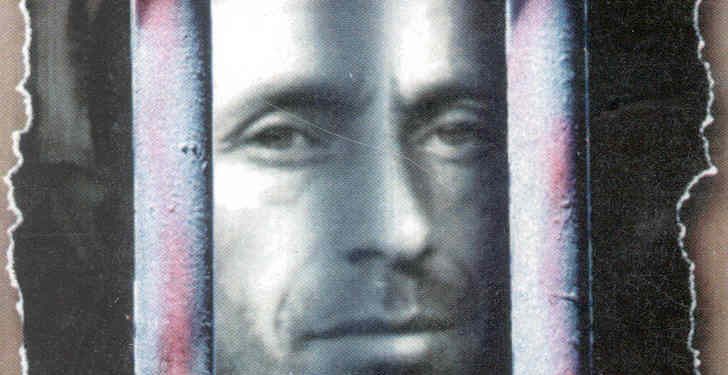
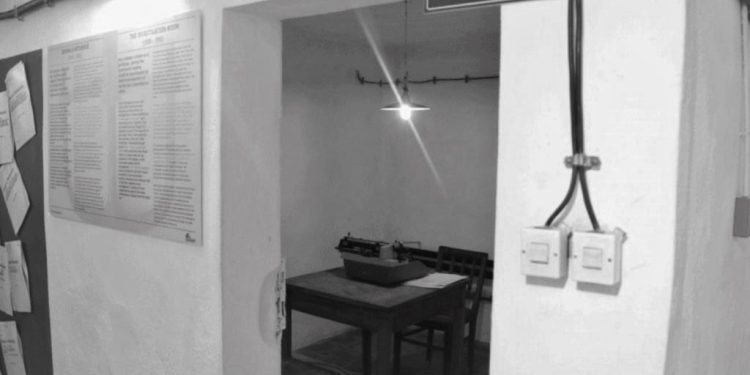

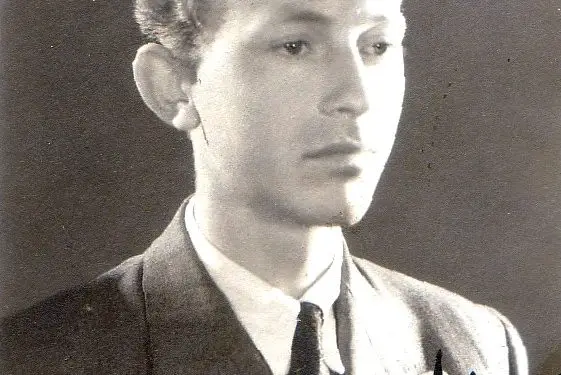
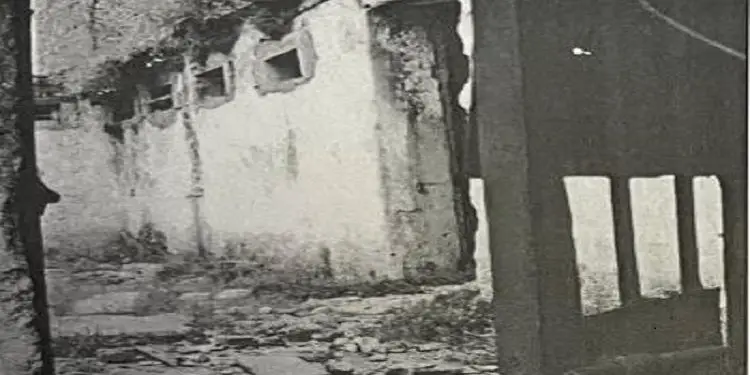
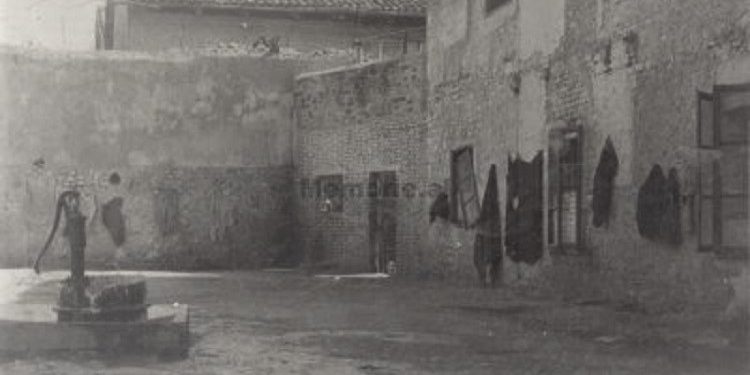
![“The ensemble, led by saxophonist M. Murthi, violinist M. Tare, [with] S. Reka on accordion and piano, [and] saxophonist S. Selmani, were…”/ The unknown history of the “Dajti” orchestra during the communist regime.](https://memorie.al/wp-content/uploads/2026/02/admin-ajax-3-350x250.jpg)
![“In an attempt to rescue one another, 10 workers were poisoned, but besides the brigadier, [another] 6 also died…”/ The secret document of June 11, 1979, is revealed, regarding the deaths of 6 employees at the Metallurgy Plant.](https://memorie.al/wp-content/uploads/2026/02/maxresdefault-350x250.jpg)




